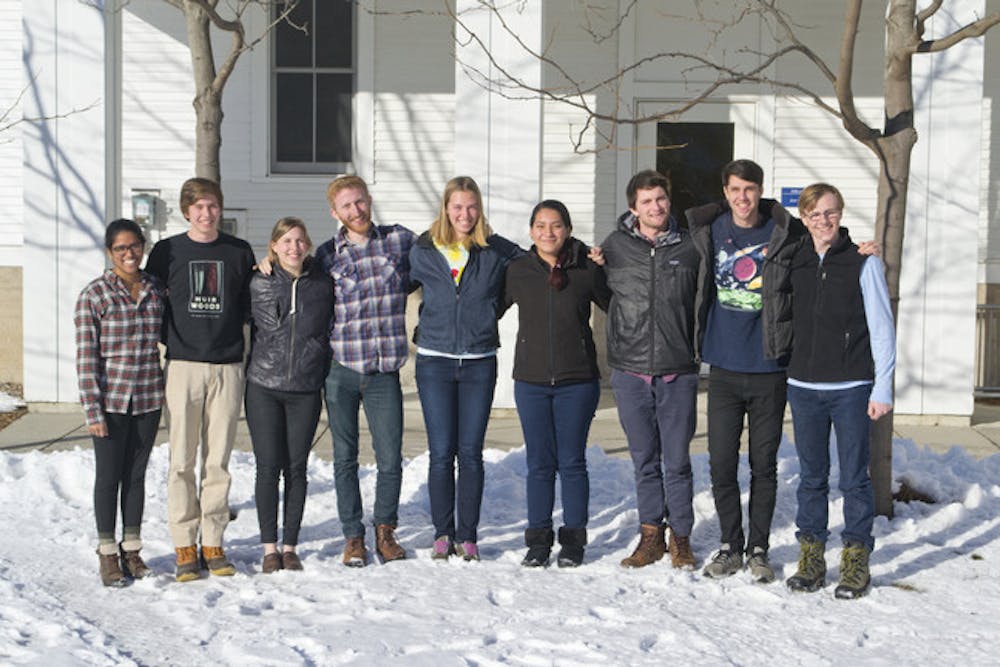On February 9, a mobile app created by a collaboration of students at the College won third place in the (Em)Powering Grid Resilience Competition. The student-led initiative designed the app ReGrid to create a direct connection between utility companies and their customers as a way to diminish environmental consequences in microgrid development.
Last fall, Isaac Baker ’14.5 discovered the competition when researching for his J-term class on the microgrid. Baker brought the competition to the awareness of Sunday Night Group, and a team was formed composed of students from an array of disciplines and years.
“I’ve always been very interested in broad banner sustainability, but energy is something that is very tangible that affects all of us in our daily lives. That was attractive to me,” Lindsay Warne ’15 said. “It was a way to actually apply this knowledge and really grapple with the messiness of what energy sustainability looks like.”
The twelve members of the Middlebury team set to answer Spark Clean Energy’s prompt, which asked eighteen universities to use technology to build a more environmentally stable grid.
“The prompt itself was so vague. It was this awesome, slightly terrifying creative problem solving process. A lot of the time we had to say what are we actually doing, what is the real problem here, which is exciting but also challenging. We got really interested in this idea of resiliency and grid electrical strategies,” Warne said.
The team designed the app ReGrid, which creates an aggregate interface for microgrid customers to control their electricity usage. ReGrid enables customers to view their utility bill, report power outages, and participate in load reduction savings day under a demand response program. The app allows customers to save money and be more energy efficient, while benefiting the utility companies by stabilizing the microgrid through customer usage. Members of the team including Zach Berzolla ’18 spent three weeks developing the idea.
“We put [the app] together piece by piece. We built this massive flow chart of how we wanted to design the app, which took up the whole whiteboard,” Berzolla said.
“We pulled pieces from what we knew existed. For example, with outage reporting we thought it could be a little bit like Waze.”
Once the students developed the idea, they worked on Adobe Photoshop and Illustrator to design the interface and submit ReGrid to the competition. For freshman students like Emma Ronai-Durning ’18, the competition was a great way to get involved in a team project.
“I’ve been sort of brought up as an environmentalist, but I hadn’t done anything active till I got [to the College]. [The competition] was a good way to participate in a hands-on project,” Ronai-Durning said. “It was fun to work with a group that was super motivated. There was a lot of energy. People wanted to get things done. It was cool to see a project from start to finish.”
After the team submitted their project, Spark Clean Energy interviewed the team including Berzolla about their design.
“They grilled us, asking what about costs, what about the backend, how is this going to get crunched in, how are the utilities going to see this, and what kind of infrastructure do we need. It was intense,” Berzolla said.
Baker and Forrest Carroll ’15 presented ReGrid at the 2015 ARPA-E Energy Innovation Summit in Washington, D.C to a panel of microgird industry representatives.
“Everyone wanted it to be fair, so deciding who was going to present was a little hard. No one wants to be exclusive. We wanted everyone to participate,” Ronai-Durning said.
The undergraduate Middlebury team won third place behind graduate teams from the University of Southern California and Cornell. Spark Clean Energy now owns the rights to the ReGrid app.
“The ideas is that [Spark Clean Energy] will incorporate the information into their business model, but in terms of this going further on campus, not so much,” Warne said. “It was sort of a tangential project into the broader micro grid.”
The ReGrid team won a cash prize, which in the future will be put towards other environmental projects on campus.
“In terms of how this fits into things at Middlebury, we see it as a broader move within the Environmental Studies program towards experiential learning opportunities and how that relates to liberal arts. This was a completely student-run initiative and was sort of the tip of the iceberg of what value student-led projects can bring to the university,” Warne said.
Nan Jenks-Jay, Dean Of Environmental Affairs, agreed with Warne in a press release on Feb. 5: “Today we cannot begin to predict the environmental solutions a group of smart and motivated Middlebury students will design when left to their own devices, creativity, and collaboration – the ReGrid app is a perfect example!”
Microgrid App Wins Big at 3rd Place

Comments


